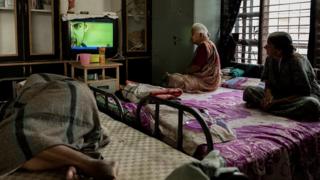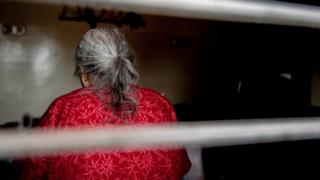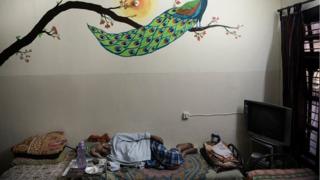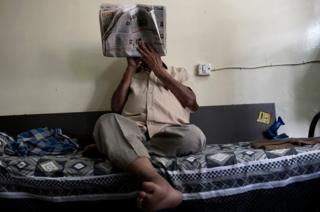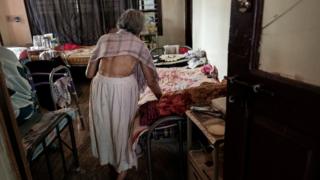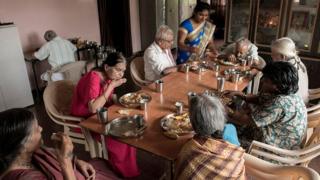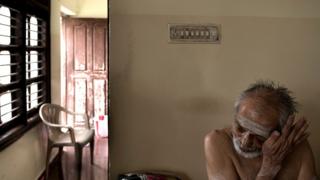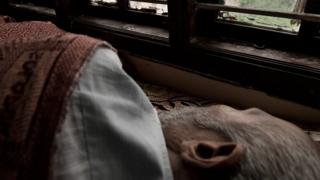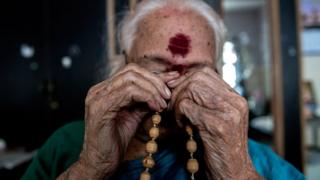‘I don’t want to be a burden’: Life in an Indian care home
For the elderly living in care homes, life is both calm and chaotic. Photographer Sayan Hazra spent more than a year chronicling the lives of residents at one such care home in southern India.
There are more than 100 million Indians over the age of 60, according to the 2011 census. And their future is uncertain as the Indian family has changed significantly in the past few decades. Large, joint families have increasingly given way to smaller, nuclear ones; and a large number of Indians no longer live in the same cities or the same country as their parents.
“I can’t hear or walk properly,” says Sumati, 76, one of the residents in the care home. Ms Sumati, like the others, says she preferred to use her first name only to protect her identity.
She suffers from partial speech problems, diabetes and hypertension.
She spent most of her life taking care of her family but she says it’s best for her to live in a care home now. Traditionally, children have cared for their ageing parents. But in the past decade, the number of elderly Indians who willingly or unwillingly spend the last few years of their lives in care homes has gone up.
“What will I do if I go back home? I don’t want to burden my children,” adds Ms Sumati.
Eighty-year-old Parameswar, who moved to the care home five years ago, says he can’t sleep well most nights.
“When your family doesn’t support you in your old age, these homes give you a place to stay and food to eat for the rest of your days,” he says.
His wife, who he was married to for 50 years, died about three years ago. He often talks about how much he misses her.
Mr Parameswar has also lost vision in his left eye. But he still enjoys reading the newspaper every day. His face lights up at the mention of politics or sports.
He also practises yoga on most mornings.
Sarada, 93, ended up in a care home after her husband died.
At first, she divided her time between the homes of her two sons, living for six months with each of their families. Before they went on a holiday, they would drop her at a care home. But gradually, Ms Sarada says, she began to feel that she was “unwanted”. So she decided to move into a care home permanently.
“I never thought I’d have to stay in a care home,” she adds. “I don’t want anything from life now – I am just counting my days here until I die.”
The residents of the care home spend time with each other, often eating meals together like they used to with their families.
“Even though I don’t like staying here, we all need a place to live in and some food to eat – especially when we’re this old,” Ms Sarada says.
She is fond of reading – both novels as well as religious books – and that keeps her busy all day.
“Change is the law of the universe,” says Satyanarayan, 80, who started living in the care home five years ago – he had difficulty adjusting to life at the home and living with strangers.
He says he moved into the home because his family could no longer take care of him. He adds that he doesn’t meet his family anymore.
“You can become a millionaire or a beggar in an instant. But life moves on,” he says.
Nagaraj moved into the care home four years ago after he was diagnosed with elephantiasis, a disease which causes severe and painful swelling in the limbs. He says his family told him that they could no longer care for him.
He loved music and he spent hours listening to the radio in his room.
“Life and death is in god’s hands,” he told Mr Hazra who met him earlier this year. “We are merely puppets dancing on his directions.”
He died in March, four days after he stopped taking medicines and eating food. He was 62.
Susheela, 102, clutches her prayer beads and chants mantras through the day. She also sings. She says that she remembers details of her early life but isn’t comfortable talking about her family.
When 67-year-old Laxmi, who had been living in the care home for two years, died in June 2018, no-one came to claim her body. So staff at the home performed her funeral rites.
All that is left when the residents pass away is the mundane and intimate evidence of the life they lived – a phone, a watch, a radio.
Sayan Hazra is a photographer based in India. The name of the care home and the last names of its residents have been withheld upon their request.
Source: Read Full Article
